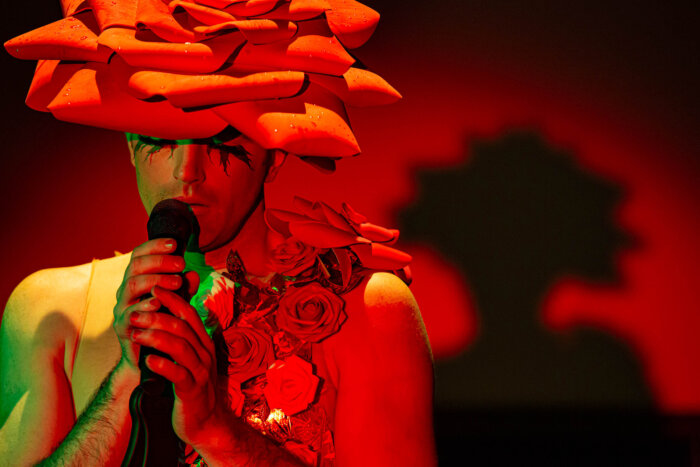Now in its 24th year, the Philadelphia Film Festival has gone through many changes, starting off as a mom-and-pop organization and now a lavish, two-week affair that nabs the hottest tickets along with diamonds in the rough. This year scores some of the season’s hottest films, opening with no less than “Anomalisa,” Charlie Kaufman’s first film since 2008’s “Synecdoche, New York,” and a stop-motion film on top of that. Here are some titles you should consider in the first week of the PFF, which runs from Oct. 22 through Nov. 1. (Visit the site for tickets and showtimes.) RELATED: “Bridge of Spies” is a tough Spielberg with a hilariously grouchy Tom Hanks ‘Anomalisa ‘ ‘As I AM: The Life and Times of DJ AM’ ‘The Birth of Sake’ ‘Brooklyn’ ‘Carol’ ‘El Cinco’ ‘Disorder’ ‘In the Shadow of Women’ ‘The Lobster’ ‘Men & Chicken’ ‘Mia Madre’ ‘My Golden Days’ ‘Rams’ ‘Room’ ‘(T)error’ ‘The Treasure’ The 24th Philadelphia Film Festival runs from Oct. 22 through Nov. 1. Please visit the site for tickets and showtimes. Follow Matt Prigge on Twitter @mattprigge and Gary M. Kramer @garymkramer
4 Globes
In this fabulous, stop-motion animated film, Michael Stone (David Thewlis) is a motivational speaker on a business trip to Cincinnati. His life is so colorless it could be in black-and-white. However, when he meets the effusive Lisa (Jennifer Jason Leigh), he is awakened by a unique quality of hers (that should not be revealed). “Anomalisa” has a canny conceit, one that allows co-directors Charlie Kaufman and Duke Johnson use to hang funny-clever running jokes, sight gags, and other gimmicks that will satisfy discerning viewers. But the film also has a deliberately somber Edward Hopper-esque melancholia that is highly affecting. (Gary M. Kramer)
3 Globes
The late DJ AM, aka Adam Michael Goldstein, was one of the first DJs to become a name, first with his skills, later with his skills combined with his habit of dating tabloid celebrities (like Nicole Richie). The official doc on his life makes sure you see him more as an artist, and also as a person who struggled with drug addiction. Goldstein was someone who turned DJing into a true musical skill; not only could he mix and match and scratch, but he also popularized the short spin, playing only portions of songs before connecting them to another, then another, etc. The quicksilver speed with which he switched songs was as impressive as a boffo guitar solo. His personal demons are handled with the right amount of empathy, never playing the blame game but understanding that once it hooks into someone drug addiction never, ever lets go, even in remission. (Matt Prigge)
3 Globes
Heavy on mood but hardly short on intel, this look at a 140-year-old Japanese brewery is a hushed and contemplative affair, over half of which is hypnotic stares at rice being raked and liquid being heated. (It’s shot in the rectangular-shaped cinemascope — a rare stylistic move for a doc.) It’s as gentle as the workers, but equally mournful. Their job is monastic, forcing them to spend half the year away from their families and holed up, much like shipworkers off on a long stint. That they’re practicing a dying art doesn’t help either; the number of breweries has dropped over the last century by over a fourth, and they worry that they may be dedicating their lives to a tradition that’s on the way out completely. (Matt Prigge)
3 Globes
An old-time romance sensitive and patient enough to make you wish it went deeper, “Brooklyn” heads to the 1950s to watch the courtship between a young Irishwoman (Saoirse Ronan) new to New York and a shy, earnest Italian-American (Michael Zegen). Like “Carol,” the subject is whether true love can actually thrive given the restrictions of society and life; here the boundaries involve different cultures, class and the pull of back home. Just as it’s threatening to expose unhappy truths about the mysteries of the human heart, it pulls back, settling for something more pat and reassuring. But it’s so beautifully made and felt that you might not mind. (Matt Prigge)
4 Globes
Todd Haynes’ lesbian drama, in which Rooney Mara’s 1950s shopgirl is pursued by a wealthy dame (Cate Blanchett), isn’t a straight-up political film like the didactic and artless “Freeheld.” It’s in fact artful — an impossibly lush romance in a minor key that’s more interested in exploring how one conducts the business of love when one can’t even say its name. Blanchett and Mara carefully negotiate the terms of a relationship that’s prevented by both sexual mores and class, putting us in the head space of people forced to think practically about the least practical of emotions. (Matt Prigge)
4 Globes
A lovely, modest gem, “El Cinco” concern Paton (Esteban Lamothe), an Argentine soccer captain whose suspension from the game has prompted him to pursue a life off the pitch. Although he seems ill-suited to school and has trouble making professional decisions, his relationship with his wife, Ale (Julieta Zylberberg) is reinvigorated. The ingratiating Lamothe gives a beautifully modulated performance as man struggling to reinvent himself. His anger and frustrations are palpable, as is the love and support Ale provides. “El Cinco” is both moving and inspiring as it delicately traces the ways — large and small — these realistic characters change. (Gary M. Kramer)
4 Globes
In this slow-burn French import, Vincent (Matthias Schoenaerts) is a beefy soldier with PTSD. Taking a personal security job for Whalid (Percy Kemp), he is asked to “babysit” Whalid’s wife Jessie (Diane Kruger) and their son Ali (Zaïd Errougui-Demonsant) for 48 hours. Vincent takes his work seriously — possibly too seriously — as he eavesdrops, observes, and perceives threats. Director/co-writer Alice Winocour shrewdly uses sound, silence, and video to immerse viewers in Vincent’s mindset, and she ratchets up the tension as he dutifully protects his clients from chaos. As a character study, “Disorder” may be a bit thin, but Schoenaerts is superb. (Gary M. Kramer)
4 Globes
France’s Philippe Garrel, one of the great chroniclers of failed relationships (including “Regular Lovers” and “The Frontier of Dawn”), does it again, charting a couple who both wind up sneaking off for affairs. Told in crisp black-and-white, it dwells on the heaviness of living day-to-day with equal parts guilt and disdain for your partner. Every interaction, every movement, every word is loaded with pain, and we watch as Garrel calmly lays out the pain and even secret joys of intimacy. (Matt Prigge)
4 Globes
For his third film, “Dogtooth” maker Yorgos Lanthimos gets a name international cast, but everything else is the same. Once again he focuses on an absurdist form of oppression, here a dystopia where the single are shlepped off to a country house, where they have 45 days to mate or else. Or else what? Or else they’re turned into the animal of their choice, of course. With Colin Farrell, Rachel Weisz and John C. Reilly as the sadsacks, it’s at once pitch black hilarious and impossibly sad, depicting a world where all joy of human interaction has been reduced to spirit-crushing practicality, enforced by a revolving door of oppressors who are everywhere no matter where you go. (Matt Prigge)
4 Globes
In this offbeat comedy about genetics, Elias (Mads Mikkelsen) and Gabriel (David Dencik) are very different brothers who learn that their father was not their real dad. Heading to an island where their other half-brothers live in an abandoned sanitarium, Gabriel and Elias discover something even more disturbing. “Men & Chicken” has a screwball/goofball sensibility as the siblings fight violently, argue over (and swap) dinner plates, and cage rule-breakers. Then things get really bizarre. Writer/director Anders Thomas Jensen does have valid reasons for all this anarchy and absurdity, but as Elias and Gabriel are warned: it may be better not to know. (Gary M. Kramer)
3 Globes
A return to form for Italy’s Nanni Moretti after the bizarrely wan “We Have a Pope,” this dramedy is two films: one following its lead (Margherita Buy) as she struggles to direct a serious labor strike saga with an uncooperative American lead (a wigged-out John Turturro), the other showing her dealing with the imminent death of her mother (Giulia Lazzarini). As ever Moretti is deadpan and wise, rattling off sharp observations, especially about how we treat the dying like children, afraid to cope with the oblivion of loss. It’s the insights that hold this sometimes rickety contraption together. (Matt Prigge)
4 Globes
French filmmaker Arnaud Desplechin’s films are reliably overstuffed with pure stuff, often brimming over the pot. “My Golden Days” is not only one of his busy looks at the love lives of the over-stimulated, like “Kings and Queen” and “A Christmas Tale.” It’s a prequel, of sorts, to his 1996 great “My Sex Life…or How I Got into an Argument,” catching back up with grouchy Paul Dedalus (Mathieu Amalric, Desplechin’s own Robert De Niro) as he reflects back on his youth, when he’s played by the charismatic Quentin Dolmaire. Chief among his obsessions is his on-off relations with Esther, once played by Emmanuelle Devos, now portrayed by Lou Roy-Lecollinet, whom he pursues right before he’s whisked away to school. That Roy-Lecollinet looks little like Devos (she’s blond, for one) is a sign that Desplechin doesn’t mean this as a strict brother film to “My Sex Life.” It’s free to do whatever it wants — to bottle up a story of young romance that’s definitely familiar but also infused with the filmmaker’s exceedingly unique voice. It teems with details, with grumpiness, with romanticism and with ever-darting camerawork, all in service of capturing if not Desplechin’s own golden days then that feeling where every sensation feels new and decidedly extreme. (Matt Prigge)
3 Globes
“Rams” depicts the jealousy and rivalry between Kiddi (Theodor Juliusson) and Gummi (Sigurour Sigurjonsson), two aging, ornery, and rather unpleasant Icelandic sheep-ranching brothers. But what could have been a gleefully nasty black comedy is more mild than wild. When Gumi suggests Kiddi’s sheep have a virus, all the village’s animals must be killed. But that doesn’t stop someone from hiding his flock and trying to get away with it. “Ram”s has some amusing moments as the estranged brothers alternately hurt and reluctantly help one another. But other than an incident with a shovel, this crowd-pleasing film has few genuine surprises. (Gary M. Kramer)
3 Globes
A traumatic story told with grace and even pep, “Frank” director Lenny Abrahmson’s fest favorite lets us slowly piece together why a young mother (Brie Larson) and her rambunctious five-year-old (Jacob Tremblay) never seem to leave a box-sized room. The truth is deeply upsetting, but this is the rare film that doesn’t shove our faces in horrors, instead hewing to a hyperactive child’s perspective. The second half, when things turn much different and much calmer, can’t help but feel like a necessary evil, but the first is dynamic filmmaking that does its two game leads right. (Matt Prigge)
4 Globes
A devastating real-life dark comedy spliced with a despairing study of loneliness, this doc hangs with Saeed Torres, a former Black Panther who spent post-9/11 as a covert informant for the feds, spying on the Muslim community and turning in dodgy reports. The film spends years with him as every encounter is predicated on lies, and every move is questionable, all while we get a glimpse of how bureaucratic disorganization leads to unnecessarily ruined lives. But it’s Torres’ sadness that sticks out the most — a man who let himself be cut off from any form of meaningful human interaction. (Matt Prigge)
5 Globes
Corneliu Porumboiu’s “The Treasure” is a buried treasure movie, but it’s also a Romanian New Wave movie. Films of its ilk — “The Death of Mr. Lazarescu,” “Four Months, Three Weeks, Two Days,” Porumboiu’s own “Police, Adjective” — err toward the grim and hopeless, capturing a society tied up in Kafkaesque bureaucracy and endless knots of red tape. As such, this simple adventure gets hilariously dragged down to a particularly miserable place on earth. And yet, watch enough Romanian cinema and you think you know the grim place this is going to end. But you’re wrong — hysterically, memorably wrong. (Matt Prigge)































